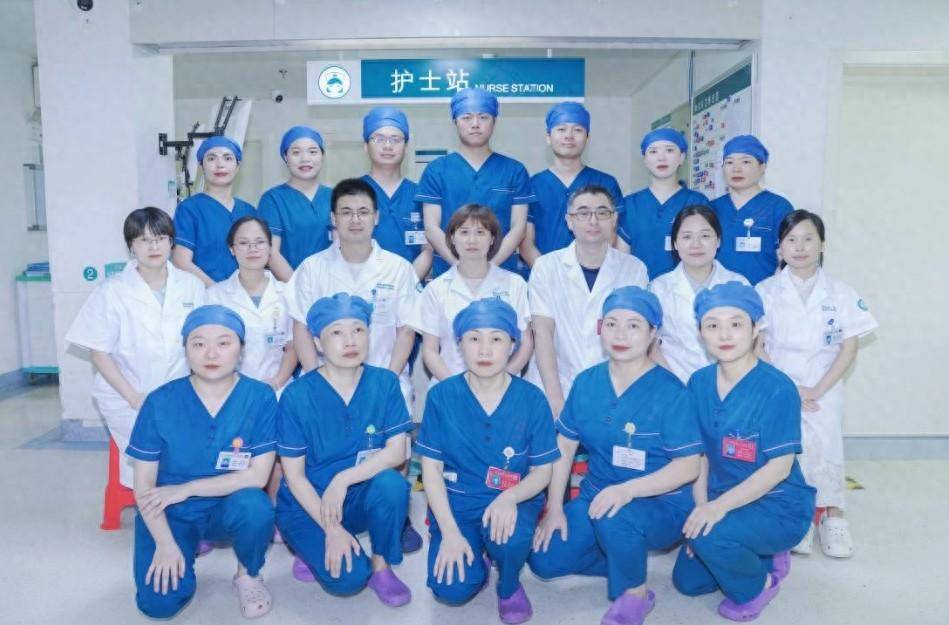Grandpa Liu, who lives in Changsha, has been suffering from schizophrenia for over 20 years, but has always adhered to a regular medication schedule and routine check-ups. His daily life and work are no different from normal. Recently, due to lax supervision from his family, Grandpa Liu missed taking his medication a few times. Worried about a relapse, he increased the dosage on his own and also used leftover tranquilizers. Subsequently, he experienced confusion, agitation, high fever, and muscle stiffness all over his body. His family promptly took him to the Emergency Department of the Second People’s Hospital of Hunan Province (Provincial Neurology Hospital) for treatment.
Examinations revealed a high temperature of 39°C, significantly elevated enzyme spectrum, rapid heart rate, rapid breathing, and neck stiffness. He was immediately transferred to the Intensive Care Unit for Neurological Disorders for diagnosis and treatment.
After reviewing the medical history and conducting a comprehensive analysis with the family, Dr. Xiong Meishan suspected Neuroleptic Malignant Syndrome (NMS) after ruling out intracranial and severe organ infections.
The patient had high enzyme levels, profuse sweating, reduced urine output, acute renal dysfunction, hypernatremia, hyperkalemia, and other internal environment disorders. Relevant medications were immediately discontinued, intravenous fluid support was provided, and comprehensive treatments such as blood filtration and electroshock therapy were administered. With timely and professional treatment from the Intensive Care Unit for Neurological Disorders, Grandpa Liu’s condition gradually improved after a week. His consciousness became clear, enabling communication, and he was successfully transferred to a general ward for further treatment.
Dr. Xiong Meishan explained that Neuroleptic Malignant Syndrome (NMS) is a critical condition in psychiatric illnesses, rare but life-threatening, mainly occurring after taking antipsychotic medications. Abrupt discontinuation of dopamine agonists (such as Pramipexole) during Parkinson’s disease treatment can also trigger NMS.
Fever, altered mental status, muscle rigidity, and autonomic instability symptoms (tachycardia, sweating, unstable blood pressure, rapid breathing, etc.) are the four typical symptoms of Neuroleptic Malignant Syndrome. Without timely treatment, the condition can progress to severe stages, leading to cardiac issues, renal failure, life-threatening blood clots, severe infections, and other critical problems.
Chief physician Dr. Zhou Gaoya mentioned that Neuroleptic Malignant Syndrome is a rare but severe medical emergency previously known as “lethal hyperthermia.” Without prompt treatment, it can be fatal, although most patients fully recover after treatment.
Patients receiving antipsychotic medications are at high risk for this condition. Nearly all antipsychotic medications available can lead to Neuroleptic Malignant Syndrome. Antiemetic medications used to prevent vomiting can sometimes cause the syndrome, albeit infrequently. The syndrome can also occur in Parkinson’s patients and is often related to sudden cessation or rapid reduction of antiparkinsonian medications.
Patients with mental disorders should never self-medicate or mix multiple medications without guidance from a specialist. Strictly follow the doctor’s instructions when taking medications.
If your family member or someone you know has used suspicious medications and exhibits the abovementioned symptoms, discontinue the causative medication immediately. Severe cases require hospitalization for monitoring and systematic treatment. Most patients show improvement within about 2 weeks after treatment; however, delayed treatment can lead to fatalities.
Neuroleptic Malignant Syndrome is one of psychiatry’s critical emergencies. The Intensive Care Unit for Neurological Disorders at the Second People’s Hospital of Hunan Province (Provincial Neurology Hospital) primarily treats critical cerebrovascular diseases, neurological infections, and neuroimmune disorders. It is a pioneering institution in China for the management of severe psychiatric illnesses and offers various technologies such as non-invasive and invasive respiratory support, blood purification, neurofunctional monitoring, bedside fiber bronchoscopy, bedside ultrasound, bedside electroencephalogram monitoring, and cerebrospinal fluid cytology, providing excellent support for the timely treatment of various severe neurological disorders.
Special author for Hunan Medical Dialogue: Long Namin from the Intensive Care Unit for Neurological Disorders, Second People’s Hospital of Hunan Province (Provincial Neurology Hospital)
Follow @Hunan Medical Dialogue for more health education information!
Special author for Hunan Medical Dialogue: Long Namin from the Intensive Care Unit for Neurological Disorders, Second People’s Hospital of Hunan Province (Provincial Neurology Hospital)
Follow @Hunan Medical Dialogue for more health education information!
(Editor YT)


